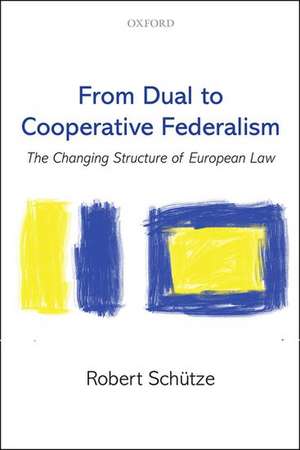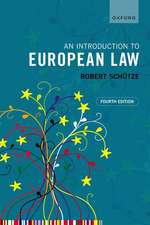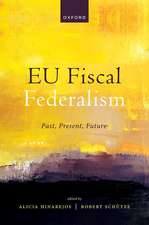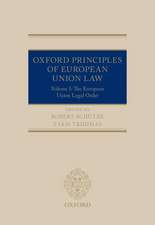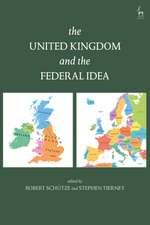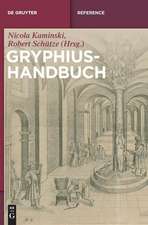From Dual to Cooperative Federalism: The Changing Structure of European Law: Oxford Studies in European Law
Autor Robert Schützeen Limba Engleză Paperback – 30 ian 2013
| Toate formatele și edițiile | Preț | Express |
|---|---|---|
| Paperback (1) | 396.53 lei 43-57 zile | |
| OUP OXFORD – 30 ian 2013 | 396.53 lei 43-57 zile | |
| Hardback (1) | 807.91 lei 31-37 zile | |
| OUP OXFORD – 15 oct 2009 | 807.91 lei 31-37 zile |
Din seria Oxford Studies in European Law
- 12%
 Preț: 664.45 lei
Preț: 664.45 lei - 20%
 Preț: 592.60 lei
Preț: 592.60 lei - 13%
 Preț: 737.91 lei
Preț: 737.91 lei - 30%
 Preț: 592.04 lei
Preț: 592.04 lei - 30%
 Preț: 594.53 lei
Preț: 594.53 lei - 30%
 Preț: 600.73 lei
Preț: 600.73 lei - 21%
 Preț: 594.65 lei
Preț: 594.65 lei - 25%
 Preț: 691.70 lei
Preț: 691.70 lei - 30%
 Preț: 540.54 lei
Preț: 540.54 lei - 30%
 Preț: 660.95 lei
Preț: 660.95 lei - 26%
 Preț: 628.96 lei
Preț: 628.96 lei - 27%
 Preț: 628.13 lei
Preț: 628.13 lei - 30%
 Preț: 616.00 lei
Preț: 616.00 lei - 30%
 Preț: 822.28 lei
Preț: 822.28 lei - 34%
 Preț: 792.09 lei
Preț: 792.09 lei - 30%
 Preț: 581.14 lei
Preț: 581.14 lei - 30%
 Preț: 628.14 lei
Preț: 628.14 lei - 34%
 Preț: 819.66 lei
Preț: 819.66 lei - 18%
 Preț: 878.23 lei
Preț: 878.23 lei - 30%
 Preț: 822.21 lei
Preț: 822.21 lei - 34%
 Preț: 913.87 lei
Preț: 913.87 lei - 30%
 Preț: 748.43 lei
Preț: 748.43 lei - 22%
 Preț: 344.80 lei
Preț: 344.80 lei - 31%
 Preț: 395.80 lei
Preț: 395.80 lei - 34%
 Preț: 750.04 lei
Preț: 750.04 lei - 30%
 Preț: 821.53 lei
Preț: 821.53 lei - 30%
 Preț: 837.50 lei
Preț: 837.50 lei - 34%
 Preț: 869.21 lei
Preț: 869.21 lei - 18%
 Preț: 930.30 lei
Preț: 930.30 lei - 18%
 Preț: 723.04 lei
Preț: 723.04 lei - 47%
 Preț: 602.65 lei
Preț: 602.65 lei - 30%
 Preț: 568.09 lei
Preț: 568.09 lei - 30%
 Preț: 790.57 lei
Preț: 790.57 lei - 31%
 Preț: 336.39 lei
Preț: 336.39 lei - 27%
 Preț: 646.49 lei
Preț: 646.49 lei - 19%
 Preț: 453.26 lei
Preț: 453.26 lei - 30%
 Preț: 869.57 lei
Preț: 869.57 lei - 30%
 Preț: 339.05 lei
Preț: 339.05 lei - 30%
 Preț: 747.20 lei
Preț: 747.20 lei - 33%
 Preț: 650.36 lei
Preț: 650.36 lei - 30%
 Preț: 734.07 lei
Preț: 734.07 lei - 34%
 Preț: 687.44 lei
Preț: 687.44 lei - 47%
 Preț: 535.28 lei
Preț: 535.28 lei - 30%
 Preț: 582.54 lei
Preț: 582.54 lei - 30%
 Preț: 672.71 lei
Preț: 672.71 lei - 30%
 Preț: 719.33 lei
Preț: 719.33 lei - 30%
 Preț: 701.66 lei
Preț: 701.66 lei - 30%
 Preț: 581.46 lei
Preț: 581.46 lei
Preț: 396.53 lei
Nou
Puncte Express: 595
Preț estimativ în valută:
75.87€ • 79.43$ • 62.78£
75.87€ • 79.43$ • 62.78£
Carte tipărită la comandă
Livrare economică 07-21 aprilie
Preluare comenzi: 021 569.72.76
Specificații
ISBN-13: 9780199664948
ISBN-10: 0199664943
Pagini: 432
Dimensiuni: 159 x 234 x 25 mm
Greutate: 0.66 kg
Editura: OUP OXFORD
Colecția OUP Oxford
Seria Oxford Studies in European Law
Locul publicării:Oxford, United Kingdom
ISBN-10: 0199664943
Pagini: 432
Dimensiuni: 159 x 234 x 25 mm
Greutate: 0.66 kg
Editura: OUP OXFORD
Colecția OUP Oxford
Seria Oxford Studies in European Law
Locul publicării:Oxford, United Kingdom
Recenzii
...this volume will give for sure an important contribution to the "rehabilitation" of the federalist approach.
In an overwhelmingly important book Schutze brilliantly exposes the obscurantist anti-realistic vision of the European federation in such a splendidly clear and overwhelmingly convincing way that those who will not open their eyes now are not just wrong out of principle. They are blind. For all the rest there is a discovery to make: there were and there are more federations in the world that just the EU.
...a timely and relevant contribution that provides for a totally enjoyable and inspiring read and helps us understand better the structure of European Law.
...a valuable tool, covering political aspects of federalism, its application to the EU, and the stance of the ECJ with an interdisciplinary approach.
In an overwhelmingly important book Schutze brilliantly exposes the obscurantist anti-realistic vision of the European federation in such a splendidly clear and overwhelmingly convincing way that those who will not open their eyes now are not just wrong out of principle. They are blind. For all the rest there is a discovery to make: there were and there are more federations in the world that just the EU.
...a timely and relevant contribution that provides for a totally enjoyable and inspiring read and helps us understand better the structure of European Law.
...a valuable tool, covering political aspects of federalism, its application to the EU, and the stance of the ECJ with an interdisciplinary approach.
Notă biografică
Robert Schütze is a Professor of law at Durham University.
